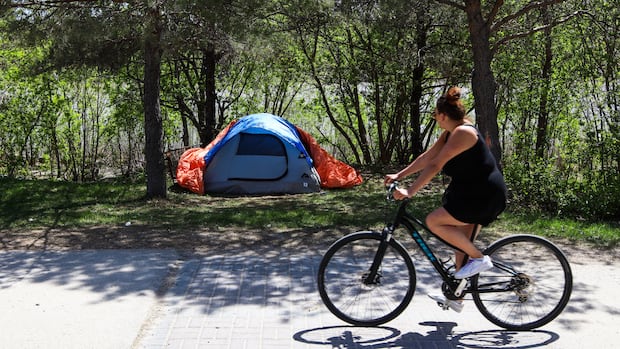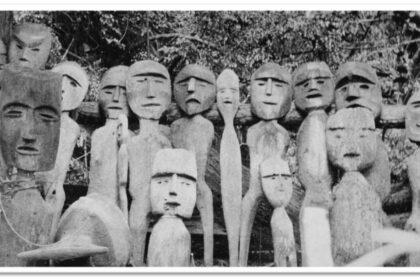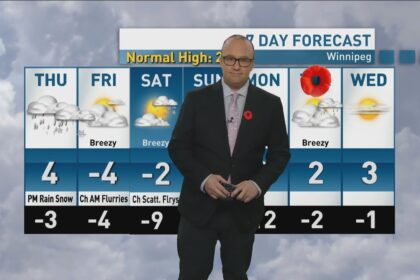ManitobaThe City of Winnipeg laid out a three-level priority approach to removing encampments from public spaces, which is set to go into effect Nov. 17.100 camps, 700 people living in them as of August, city saysCameron MacLean · CBC News · Posted: Oct 29, 2025 10:13 PM EDT | Last Updated: 42 minutes agoListen to this articleEstimated 4 minutesThe city will prioritize enforcement on camps near sensitive areas listed in the policy, and those that pose an immediate risk to life safety. (Prabhjot Singh Lotey/CBC)Homeless encampments in sensitive areas near playgrounds and those that pose immediate risks to safety will get highest priority under the City of Winnipeg’s plan to restrict where tents can be set up. The city released details of its plan in a report, set to go before the community services committee next week. Using data from the provincial homelessness strategy, the city estimates there were about 100 encampments across Winnipeg as of August this year, with as many as 700 people. Between June 2024 and June 2025, residents made 972 encampment-related complaints to 311.Beginning Nov. 17, tents will be prohibited near schools, playgrounds, pools and seniors’ facilities, as well as close to transit stops, bridges, piers, medians, traffic islands and rail crossings. City staff will also be able to intervene wherever “life safety” issues are found, such as open fires or unsafe structures.A new encampment response protocol sets out how the city will respond, depending on the risks and impacts of each site, using a three-level system.Level 1: Camps near sensitive areas laid out in the policy, or posing immediate risks such as fire, will trigger urgent, co-ordinated responses, with a notice period for cleanup to occur.Level 2: Larger sites on non-sensitive land with debris, unsanitary conditions or unpermitted structures will face co-ordinated cleanups after outreach and notice.Level 3: Small, low-risk sites will be monitored by outreach workers rather than cleared right away.The city will create an encampment co-ordination table, including officials from departments like public works, the Winnipeg Fire Paramedic Service, police, community development and Winnipeg Transit to triage encampments, set priorities, and co-ordinate cleanup and enforcement efforts.’Reasonable and compassionate’Enforcement will take place mainly during daylight hours, starting an hour after sunrise and ending an hour before sunset. Officials say that approach recognizes people need somewhere to sleep at night, but is designed to prevent long-term encampments from becoming entrenched and creating fire hazards, environmental damage or public safety concerns.Greg MacPherson, Winnipeg’s acting manager of community development and author of the report, said the intention is not to criminalize people but to manage public spaces more consistently. “Wherever we can, I think we’re going to approach that work with just being very reasonable with people,” MacPherson said.“These are vulnerable citizens. We aren’t going to go in and try to hurt anyone. I think it’s to work in collaboration with our outreach partners to make sure that our approach is as reasonable and compassionate as possible.”The plan does not include any new staff or additional funding.Initial staffing for the plan will consist of two bylaw officers and a co-ordinator, selected from current city employees. Garbage removal will be funded with $200,000 from the existing public works budget.MacPherson said there may be a need for additional funding or staff in the future, but for now the plan is to start the work using existing resources.He also said outreach providers such as Main Street Project, Winnipeg’s sole contracted outreach agency, haven’t been fully consulted on the new plan, though informal discussions have started. “We haven’t had time really for a full consultation, but our hope will be to work in collaboration with the sector to whatever degree we can, understanding that council’s directives were quite clear.”Officials from Main Street Project were not available Wednesday to comment.Daniel McIntyre Coun. Cindy Gilroy, who co-authored the motion calling for the encampment policy in September, says she supports the city’s plan but wants it to go further.She wants the city and province to establish a sanctioned encampment where people could stay longer than a single night while being connected to housing and addictions supports. “If we had a site … that the city has set aside, where people can camp for longer-term than just overnight, that would give us the ability to have somebody come in … work with people, triage them and what their needs are … to help them become successful when they do get into housing,” she said.MacPherson called the city’s policy “a living document” and a “work in progress,” saying it will evolve over time.ABOUT THE AUTHORCameron MacLean is a journalist for CBC Manitoba living in Winnipeg, where he was born and raised. He has more than a decade of experience reporting in the city and across Manitoba, covering a wide range of topics, including courts, politics, housing, arts, health and breaking news. Email story tips to cameron.maclean@cbc.ca.
Friday, 6 Feb 2026
Canada – The Illusion
Search
Have an existing account?
Sign In
© 2022 Foxiz News Network. Ruby Design Company. All Rights Reserved.
You May also Like
- More News:
- history
- Standing Bear Network
- John Gonzalez
- ᐊᔭᐦᑊ ayahp — It happened
- Creation
- Beneath the Water
- Olympic gold medal
- Jim Thorpe
- type O blood
- the bringer of life
- Raven
- Wás’agi
- NoiseCat
- 'Sugarcane'
- The rivers still sing
- ᑲᓂᐸᐏᐟ ᒪᐢᑿ
- ᐅᑳᐤ okâw — We remember
- ᐊᓂᓈᐯᐃᐧᐣ aninâpêwin — Truth
- This is what it means to be human.
- Nokoma











